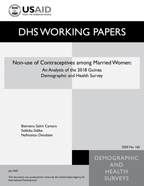- PUBLICATIONS
- JOURNAL ARTICLES
- ACCESS PUBLICATIONS
Publications Summary
- Document Type
- Working Papers
- Country(s)
- Guinea
- Survey
- Guinea DHS, 2018
- Language
- English
- Recommended Citation
- Camara, Bienvenu Salim, Sidikiba Sidibe, and Nafissatou Dioubate. 2020. Non-use of Contraceptives among Married Women: Analysis of the 2018 Guinea Demographic and Health Survey. DHS Working Paper No. 165. Rockville, Maryland, USA: ICF.
- Download Citation
- RIS format / Text format / Endnote format
- Publication Date
- July 2020
- Publication ID
- WP165
There is no printed copy available to order.
